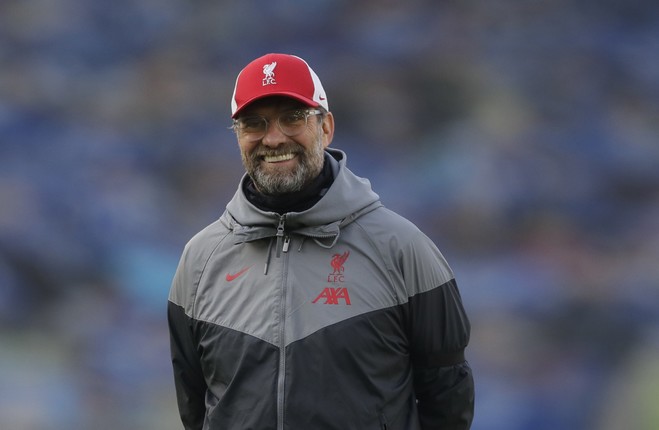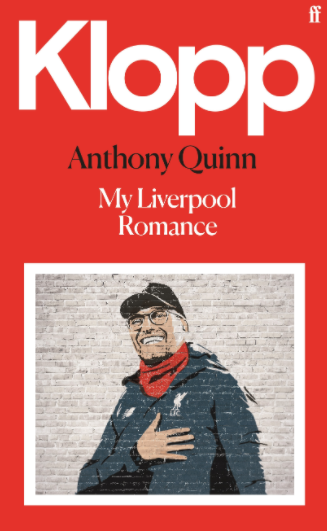THE FOLLOWING PASSAGE is an extract from Klopp: My Liverpool Romance by Anthony Quinn.
On Wednesday 11 December, the eve of the 2019 general election, the Freiburg Baroque Orchestra performed Handel’s Messiah at the Barbican Concert Hall in London.
It was a joy – and a relief – to be in a place where the dismal sound and fury of Brexit couldn’t penetrate, if only for a couple of hours. When the soprano opened Part III with the air ‘I Know That My Redeemer Liveth’ I found myself transported in a daydream of reverential delight. I imagine others around me experienced something similar.
What a lovely phrase it is – I Know That My Redeemer Liveth. . . But on this occasion it wasn’t the Divine I was pondering. My thoughts were more earthbound, temporal, absorbed in the wonders being wrought by a certain German maestro. And I don’t mean Handel.
I was still thinking of the previous night when Liverpool FC had beaten Red Bull Salzburg 2–0 and thus qualified for the knockout stages of the 2019–20 Champions League. A victory masterminded by their inimitable manager Jürgen Klopp. Is he My Redeemer? No. Is he the Messiah? He’s not even a very naughty boy.
Is he the remarkable life-force driving a football club whose glory days looked to be a thing of the past? Most definitely. And the gratifying aspect of this union between club and manager is that it felt destined. A match that was meant to be. There is literally no one else you can imagine doing the job that Jürgen Klopp has done at Liverpool.
And yet 10 years ago I had never heard of him. Not many had. Now, in 2020, he is probably the most famous and admired football manager in the world. How did this happen?
Not being a passionate devotee of the German Bundesliga I was slow to catch on to the rise of a young coach who had made a name for himself at Mainz 05 and was resuscitating the fortunes of sleeping giant Borussia Dortmund.
I think it was in 2011 when I heard his name for the first time. Liverpool were enduring an unhappy period in the doldrums, traduced by the financial mismanagement of Hicks–Gillett and, on the pitch, stuck in reverse under Roy Hodgson, a good manager in the wrong job.
Names of his potential successors were being bandied around, as names will be, including that of Kenny Dalglish. But an LFC friend, one of a handful among our Friday five-a-side game in Clerkenwell, told me ‘they ought to look at Jürgen Klopp’. Who? He gave me a thumbnail sketch, which I promptly forgot, diverted by the false dawn of Dalglish’s second term and then the brittle magnificence of Brendan Rodgers’s tilt at the Premier League title in 2013–14.
Ah, that was the season that was. Liverpool playing football at 150mph, spearheaded by an attacking trident that tore apart opponents at will, top at Christmas, five points ahead in March, surfing on a wild surmise that we’re gonna win the league. However many the opposition scored we would contrive to score one more. Until we couldn’t.
On 27 April 2014, following Chelsea’s 2–0 win at Anfield, aka The Day They Parked the Bus, I noted mournfully in my diary: . . . Glad it was Gerrard’s mistake – he’s the easiest of all to forgive. If Kolo Touré had done it, for instance, I’d have cursed Rodgers ever after for selecting him.
Meanwhile, over in Germany, Dortmund were beginning to make a noise with back-to-back Bundesliga titles, the Double in 2012, a Champions League final in 2013. Klopp was now on the radar. Following Liverpool’s sob-story implosion under Rodgers and the disastrous endgame of his final months in 2015 (Stoke beating us 6–1 in May was the low point) rumours of a replacement were twanging on the grapevine.
Carlo Ancelotti was mooted. But the name that kept echoing back was Klopp. He had already decided to quit Dortmund and take a year off. Klopp: it had a ring to it, like a famous stand. Klopp: would the prospect of Anfield lure him out of his sabbatical? Klopp! Klopp! Klopp! The hoof-beats of destiny were picking up speed, coming closer. Some fans were now so enamoured of the possibility that they petitioned Klopp’s wife on Twitter.
Rodgers, having overseen a 1–1 draw in the Merseyside derby on 4 October, was sacked the same day. By the end of that week Klopp had signed a three-year contract at Anfield and was doing a walkabout on the pitch. Let it be noted that he looked great – imposingly tall, relaxed, dressed in jeans, black shirt, black blazer, his hair neatly trimmed. The famous smile was shyly in evidence. Then he did his first press conference.
After the mutual adoration and moist-eyed emoting that characterised his relationship with the Dortmund fans, Klopp dialled it down for his Anfield inauguration. He presented himself at the microphone in a thoughtful, quietly spoken manner.
He was fully aware of the significance of his appointment (‘It’s the biggest honour I can imagine to be here’) yet he didn’t want to bang the war drum too early. The power chords of ‘Heavy Metal Football’ were kept in check. He was there to ‘try to help’ a club that, while underperforming, could hardly be considered in trouble. He couched his programme for renewal as a double appeal to the players and to the fans.
If someone wanted to help the club they had to change ‘from doubter to believer’. That was his second great soundbite. His first seemed to come by accident, though knowing his love of preparation he may just have made it look that way.
‘Does anyone in this room think that I can do wonders?’ he asked, immediately insisting that he was just a guy from the Black Forest whose mother was proud and probably watching him now on TV. ‘So I am a totally normal guy . . . I’m the normal one.’ Bullseye.
His self-deprecation not only got a laugh, it placed him in pertinent contrast to the kind of football manager who might proclaim himself, say, ‘The Special One’. Arrogance would not be the Klopp way. The only ‘special’ thing in his eyes was the club he hoped to serve. He understood Liverpool. He understood us.
He then pulled another masterstroke. ‘I hope to enjoy my work,’ he said, earnestly, looking directly at his inquisitors. ‘All the people told me so much about the British press. So it’s up to you – to show me they are all liars.’
Another big laugh. He had disarmed the press by teasing them, and they loved it. What wonderful nerve to include them in his project: I propose to you football that everyone can enjoy, players, fans, managers, and yes, even you, the nasty, snarky hounds of the back pages.
When someone asked him about the Anfield pantheon – i.e. the weight of history – he deflected the question by observing that no Liverpool manager had ever taken up the post already believing himself to be a legend. That sort of esteem had to be earned.
He repeated something he had once said at Dortmund: ‘It’s not so important what people think of you when you come in. It’s much more important what people think when you leave.’ Again the humility, the sense of perspective, resonates. The person blessed with true confidence has no need to swagger or to showboat; and his self-awareness allows him to understand others. You could build a career on it.
A wise man once said, ‘People don’t believe in ideas: they believe in people who believe in ideas.’ This is what Klopp got so right in his introduction that day. Conducting himself in a humble, humorous way, he set out key ideas – turning doubters to believers, the necessity of keeping your feet on the ground (‘normal one’), the honour of serving a storied institution – which with patience and togetherness he believed had a good chance of being fulfilled.
What’s more, in pursuing these goals (and here is a crucial Klopp component) they would have fun. In the clenched, high-stakes business of the Premier League fun is the element that often gets lost. Managers take on a haunted look pretty quickly nowadays.
Who can stand that much scrutiny? Or that much abuse? Ole Gunnar Solskjær went from bright-eyed charmer to wizened touchline Gollum in a matter of months. It’s understandable to a degree: their jobs are permanently on the line. But even the grim-faced pundits on TV – Keane, Souness, Mourinho – look like they’re auditioning for the remake of Judgment at Nuremberg. Klopp knows you must take your work seriously but not yourself, and that is the surest way to have fun.
Five years on from his arrival you would have to say his reputation has never been higher. There have been setbacks along the way — three lost cup finals — but they shrank to a footnote in May 2019 when Liverpool lifted their sixth European Cup in Madrid. Two other trophies, the Uefa Super Cup and the Fifa Club World Cup, followed in the autumn.
Halfway through the 2019–20 season Liverpool were a runaway train, unbeaten for a year in the Premier League and heading towards their first title in 30 years. They had achieved this with football of such fluency, invention and ruthlessness that even rivals doffed their caps to them. The only thing that could stop us now was a global catastrophe.
This book is not a biography of Jürgen Klopp. If you want a factual record of his life and career there are such books available. I don’t intend to write a conventional account of him, because he is not a conventional football manager. I’m pretty sure he is not a conventional human being.
Writing about someone you admire can be a way of trying to understand that person. I want to examine the things that set him apart from other football managers. His sense of humour. His boundless geniality. His off-the-cuff smartness. His ability to inspire and command. His obsessive tactical nous. His amazing set of teeth. We have come to realise what a lucky time it is to be a Liverpool fan. I imagine there was a similar feeling when Shankly began exerting his authority at Anfield in the early 1960s.
For years it was the impossible dream. I wondered if I would ever see another Liverpool title victory in my life-time. I was a doubter, now I’m a believer. Klopp has made Monkees of us all.
Klopp: My Liverpool Romance by Anthony Quinn is published by Faber. More info here.


